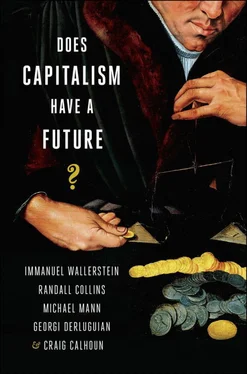The second politically significant characteristic of a structural crisis is that neither alternative “spirit” can be organized such that a small group can fully determine its actions. There are multiple players, representing different interests, believing in different short-run tactics, and coordination among them is difficult to achieve. Furthermore, the militants on each side must spend energy persuading the always larger group of potential supporters of the utility of their actions. It is not only the system that is chaotic. The struggle for the successor system is also chaotic.
What we can perceive, up to now, are the strategies that have been emerging in practice. The camp of the “spirit of Davos” is deeply divided. One group favors immediate and long-term harsh repression, and has invested its resources in organizing a network of armed enforcers to crush opposition. There is however another group who feel that repression can never work over the long term. They favor the di Lampedusa strategy of changing everything so that nothing changes. They talk about meritocracy, green capitalism, more equity, more diversity, and an open hand to the rebellious—all in the spirit of heading off a system premised on relative democracy and relative equality.
The camp of the “spirit of Porto Alegre” is similarly split.
There are those whose tactics for the transition period reflect their image of the world they want to build. It is sometimes called “horizontalism.” In practice, it seeks to maximize debate and the search for relative consensus among persons of divergent backgrounds and immediate interests. It is a search to institutionalize a functional decentralization of the movement and the world. And this group has also emphasized the reality of what is often called a “civilizational crisis,” by which is really meant a rejection of the basic objective of economic growth and substituting for this objective the search for rational balances of social objectives that will result precisely in relative democracy and relative egalitarianism.
Arrayed against them is the group that insists that, in a struggle for political power, vertical organization of some kind is a sine qua non , without which the group is doomed to failure. This group also emphasizes the importance of achieving significant short-run economic growth in the less “developed” areas of the present-day world in order to have the wherewithal to redistribute benefits.
Thus the picture is not one of a simple two-sided struggle but rather of a political field with four groups. And that is very confusing to everyone. The confusion is at one and the same time intellectual, moral, and political. And this reinforces the uncertainty of the outcome.
Finally, this kind of uncertainty heightens the short-run problems of the existing system. Such uncertainty is both exhilarating (the feeling that action makes a difference) and paralyzing (the sense that we can’t move since the short-run consequences are so uncertain). This is true both for those who benefit from the existing system (the capitalists) and those who are the vast underclasses.
So, to resume, the modern world-system in which we are living cannot continue because it has moved too far from equilibrium, and no longer permits capitalists to accumulate capital endlessly. Nor do the underclasses any longer believe that history is on their side, and that their descendants will necessarily inherit the world. We are consequently living in a structural crisis in which there is a struggle about the successor system. Although the outcome is unpredictable, we can feel sure that one side or the other will win out in the coming decades, and a new reasonably stable world-system (or set of world-systems) will be established. What we can all do is try to analyze the historical options, make our moral choice about the preferred outcome, and evaluate the optimal political tactics to get there.
History is on nobody’s side. We all may misjudge how we should act. Since the outcome is inherently, and not extrinsically, unpredictable, we have at best a 50–50 chance of getting the kind of world-system we prefer. But 50–50 is a lot, not a little.
2

THE END OF MIDDLE-CLASS WORK: NO MORE ESCAPES
Randall Collins
A long-term structural weakness of capitalism is now coming to the fore. It is the technological displacement of labor by machinery, which for the last twenty years has taken the form of computerization and information technology. This displacement is now accelerating and threatening the existence of the middle class. My argument is not very original. Marx also had a technological displacement mechanism, based on factory machinery, although in his argument it is combined with a number of other theoretical mechanisms, including business cycles, falling rates of profit, and—in current Neo-Marxian theories—financialization and financial crisis. What I want to emphasize, however, is that the process of technological displacement of labor, driven to a sufficient extreme, will generate the long-term and quite possibly terminal crisis of capitalism, all by itself and without the other processes in Marxian and Neo-Marxian theory. Business cycles may be hazy and imprecise in their timing and variable in the height and depth of their swings, as are Kondratieff waves and world-system hegemonies on the global level. Financial crises may be contingent and avoidable through the right policy. No matter. The structural crisis of technological displacement transcends cycles and financial bubbles. It is the deep threat to the future of capitalism. Yes, there are short-term crises driven by financial, cyclical and other mechanisms; but what I focus upon here is a long-term structural shift, one that very likely will bring capitalism to an end within the next thirty to fifty years.
I make no claims for the purity or authenticity of the lesson that I borrow from Marx. Sociology today, if it believes in anything, believes in multiple processes, multiple causes, and multiple paradigms for dealing with our chosen aspects of the world. In an important sense, in sociology Weber has triumphed over Marx, and we all talk about the interpenetration of class, politics, and culture, and of gender too. Nevertheless, there are moments when the key feature of long-term structural change is at issue—above all the issue of structural crisis. Here, for all our multidisciplinarity and our celebration of intellectual diversity, is an occasion when it seems to me one line of theory stands head and shoulders above all others in dealing with the mechanisms of crisis and the direction of very long-term structural change. The theory I will extol is a stripped-down version of the fundamental insight that Marx and Engels had formulated already in the 1840s.
It is a stripped-down Marxism indeed. No labor theory of value, no reference to expropriation of labor from the means of production, no alienation from species-being. It makes no ontological claims and does not posit any final emancipation at the end of the crisis. I have stripped it down to a theory of long-term economic crisis; we need other lines of sociology for what happens in response to the crisis, and what arises politically and socially afterward. Moreover, it is not a theory of the conquest of the state as result of economic crisis, not by itself alone a theory of revolution—although at the end I will discuss what sociologists have learned about the causes of revolution. And although it has implications for the future of socialism, it is not a theory of socialism and what would make socialism work better in the future than it did in the past. No, it is a theory of crisis first and foremost.
Читать дальше













